Local government offices are critical to the function of our community, but are sometimes the least understood out of all the levels of government in the United States. They provide essential services such as infrastructure support, sanitation, schools, transportation, housing, public safety and more. Local officials foster direct citizen engagement, and are often the most accessible representatives in a community.
Voting in local elections empowers us to choose leaders and policies that reflect our values and needs, making our communities stronger and more responsive.
The Institute has compiled the following guide to understanding the different types of local government found in Pennsylvania. Click the buttons below to jump directly to that section of the guide.
Types of Municipalities
“Municipality” is a county, city, borough, incorporated town, township or any similar general-purpose unit of government which shall hereafter be created by the General Assembly.
County Government/Functions
In most counties, the chief governing body consists of a three-member board of county commissioners except if there is a home rule chart that opt for a county council and an appointed manager. Lackawanna and Wayne counties have three county commissioners, while Luzerne county opted for the make-up of a council and an appointed manager. County government oversees elections, social services, the court system, prisons, and property assessments. The county also coordinates emergency management, plans for land use, solid waste disposal, and stormwater management. County government elected officials consist of commissioners/council, a treasurer, a controller, recorder of deeds, register of wills, a coroner, prothonotary, a clerk of courts, a sheriff, and a district attorney.
Municipal Powers
While living under a county government, every Pennsylvanian lives in a municipality. Municipal governing bodies make policy decisions at the local level, levy taxes, borrow money, authorize expenditures, and direct government operations through appointees. Powers provided at the local government level are not exercised throughout each municipality, while others are shared with the state and national government. All local governments share the same basic responsibilities, cities have more enumerated powers than boroughs and townships, but many of those powers may be exercised by boroughs and townships under general grants of power. The home rule provides an equal opportunity got all classes of municipalities to exercise new powers. The main areas of municipal functions include police/fire protection, maintenance of local roads, water supply, sewage collection/treatment, parking/traffic control, local planning/zoning, parks and recreation, garbage collection, health services, libraries, licensing of businesses, and code enforcement.
Boroughs
Boroughs are governed by a council, which manages hiring, budgets, expenses, and local laws, with members elected for four-year overlapping terms. Each borough has an elected mayor responsible for overseeing the police, declaring emergencies, and enforcing ordinances. Additional elected officials include a tax collector and a board of auditors or a CPA for financial audits, except where an independent auditor is appointed.
Cities
Third class cities are governed by the Third Class City Code with a city council consisting of an elected mayor and four to six council members who may be elected by wards. Council members serve overlapping four-year terms and are responsible for adopting budgets, approving expenses, and enacting local laws. The mayor, also elected for four years, is a voting council member who oversees the police, acts as the chief executive, and has the authority to declare emergencies and enforce ordinances. They must have at least 10,000 people to be a City
Optional Third Class City Charter Law
Cities can operate under the Optional Third Class City Charter Law, which allows for a council of five, seven, or nine members elected at large for overlapping four-year terms. A mayor, treasurer, and controller are also elected for four years, with the treasurer and controller functioning similarly to those in the Third Class City Code. The mayor serves as the chief executive, enforces ordinances, supervises city departments, and submits the annual budget, but does not vote on the council and has veto power over ordinances.
Philadelphia
Philadelphia which is the oldest and largest city in Pennsylvania works under a home rule government system. The mayor holds significant authority over city governance while the legislative body consists of a city council with 17 members—10 elected by specific districts and seven elected citywide for four years. Any local legislation requires council approval and while the mayor has the power to veto these laws the council can override that veto if needed and the mayor also serves for four years.
Pittsburgh and Scranton
Pittsburgh and Scranton are classified as second-class cities and operate under home rule charters. Each city has a mayor with substantial authority, tasked with developing the budget, suggesting initiatives for council consideration, and possessing the power to veto local laws. Pittsburgh’s city council consists of nine elected members, while Scranton has a smaller council with five elected members that serve for four years.
Townships of the first class
To achieve first-class status, a township must have a population density of 300 persons per square mile and receive voter approval through a referendum. Each township has at least five elected commissioners, serving four-year overlapping terms, either elected at large or by wards. In townships with five or more wards, one commissioner is elected from each ward. Additionally, a tax collector is responsible for collecting real estate taxes, and townships may elect three auditors or one controller to conduct annual audits, or they can appoint a certified public accountant for this task.
Townships of the second class
Second class townships are governed by the Second Class Township Code, which establishes a board of supervisors as the governing body. These boards consist of three or five supervisors, elected at large for overlapping six-year terms. An elected tax collector manages real estate tax collection, while a board of three elected auditors conducts audits, although the supervisors can opt to appoint a certified public accountant for the annual audit instead.
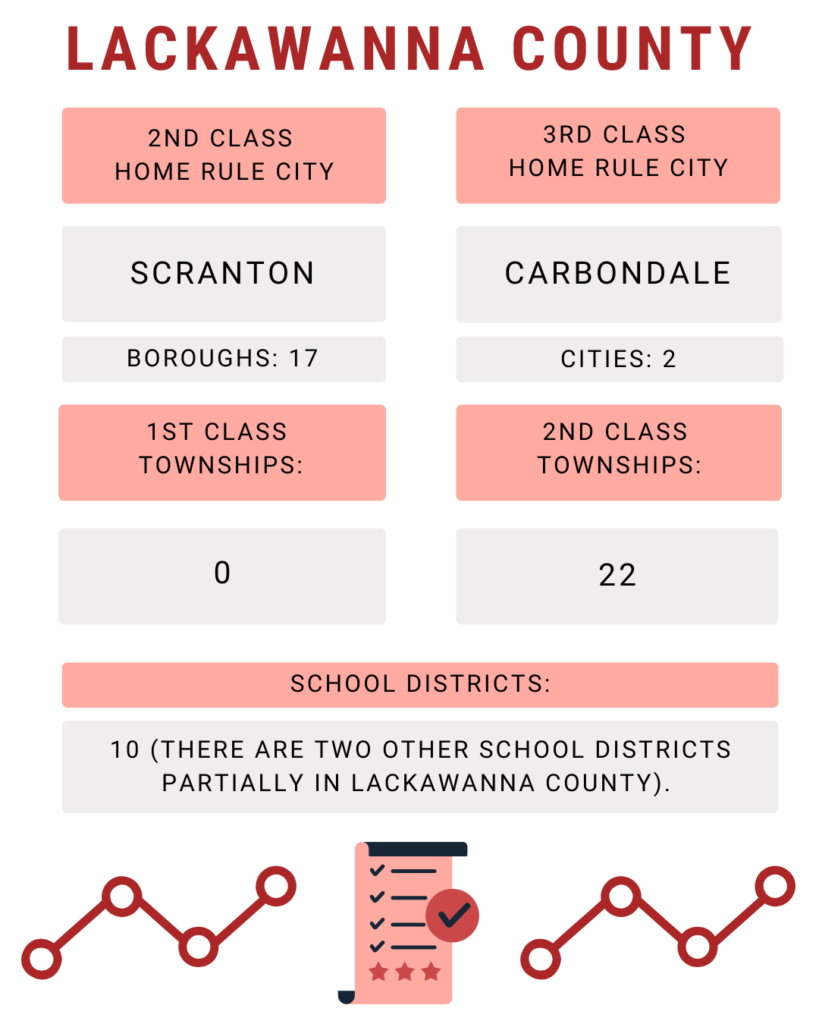
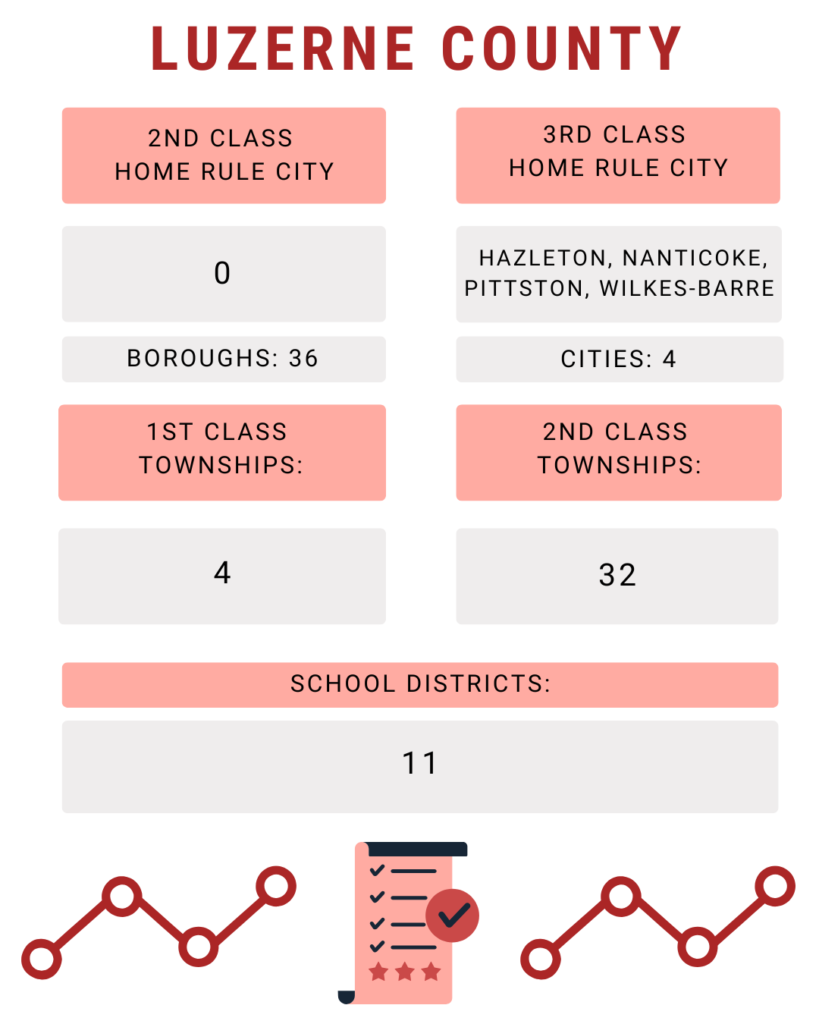
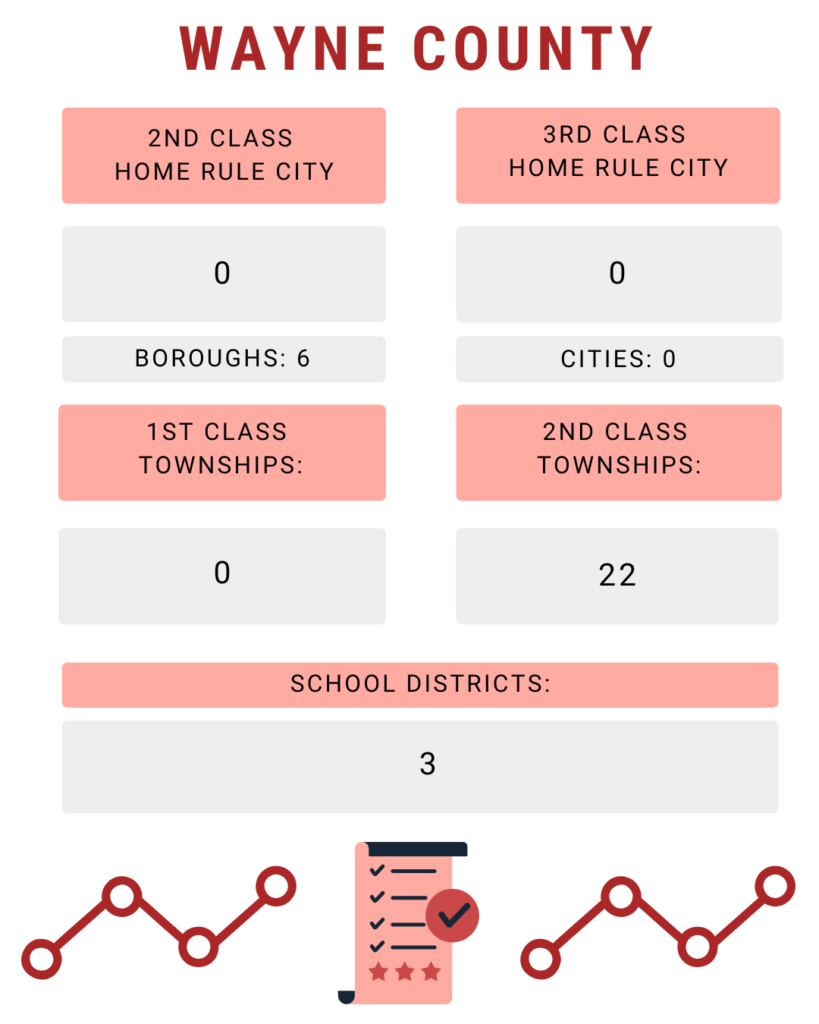
County Level Elected Positions
County Commissioner/County Council Member – 4 Year Term
According to County Code, the board of county commissioners consists of three members who are elected to serve four-year terms simultaneously. These commissioners are in charge of overseeing the governance, operations, and financial management of the county. A county may opt to form and operate under a home rule charter. If that is the case, then these elected officials are called County Council Members. The number of members is also determined by the charter. For example, Luzerne County has 11 members.
Why is it important?
As the elected officials overseeing the entire county, commissioners/members are responsible for setting policy and guidelines related to human services, elections, 911 services, prisons, courts, planning and land use, property assessments, and transportation/infrastructure projects. All of these components directly impact residents’ daily lives.
County Elected Row Officials
Clerk of Courts (Clerk of Judicial Records or Prothonotary) – 4 Year Term
The clerk of courts is responsible for the recordkeeping and maintenance of criminal records. Other documents filed with the clerk include bail payments, summary appeals, subpoenas, criminal records checks, private detective orders and expungements.
Why is it important?
It is essential for the smooth operation of the legal process that a person be responsible for court records. Whether they involve criminal, civil, or vital records (such as births, deaths, marriages, and divorces), the Clerk must handle and maintain these documents. This role safeguards individuals’ assets, protects their identity, and helps ensure the efficient progression of legal proceedings.
Coroner – 4 Year Term
Coroner’s investigates sudden and or violent deaths to determine their causes. This role includes the authority to conduct autopsies, summon witnesses, administer oaths, and issue death certificates. The coroner is usually elected by the public and may serve a term of four years, depending on local regulations.
Why is it important?
The coroner has a blend of medical, legal, and investigator skills. They determine how people have passed which may identify crimes and criminals who perpetrate them.
Controller – 4 Year Term
The controller is the chief financial officer and auditor of the county’s financial affairs. The controller audits the books, records, and accounts of all county officers and makes financial reports for the board of commissioners.
Why is it important?
The controller ensures that all county money is accounted for and use for its intended purposes. This positions helps to minimize waste and fraud.
District Attorney – 4 Year Term
As the chief law enforcement officer, the district attorney oversees all criminal investigations and prosecutions within the county. The district attorney can appoint additional staff, such as deputy district attorneys, county detectives, and clerical personnel, to assist with departmental operations. This position is typically elected and usually has a term limit of four years.
Why is it important?
The District Attorney represents the people of the county they serve. The DA protects the legal rights of the accused criminal and the victims, ensuring a fair legal process. The DA holds a powerful position that influences the punishment of guilty defendants. The DA works for the people.
Recorder of deeds – 4 Year Term
The recorder of deeds is responsible for recording and maintaining all real estate documents, such as deeds, mortgages, and subdivision plans, as well as records related to military discharges and property agreements. This official is usually elected and serves a term that can vary by jurisdiction usually around four years.
Why is it important?
This office ensures that a person’s home ownership is protected and that all documents relating to personal real estate are accurately recorded. The office also process fees to the state as required by law when property changes hands.
To ensure integrity and independence, this office is self-sufficient and generates funds for the County’s general fund. It does not depend on County money to operate and is therefore objective.
Register of Wills – 4 Year Term
The register of wills validates and files individual wills and necessary documents for managing a deceased person’s estate. They may conduct hearings to appoint an executor if no will exists and also issue marriage licenses. This position is typically elected, with a common term limit of four years. This position also serves as Clerk of the Orphan’s Court and manages many personal vital records such as marriage licenses. The position was eliminated in Luzerne County with the advent of the Home Rule Charter. It is an elected position in Lackawanna and Wayne counties.
Why is it important?
This position confirms the wishes of deceased persons and then grants the executor the authority to distribute the assets according to the deceased person’s instructions. They also handle collecting any inheritance taxes owed to the government.
Sheriff – 4 Year Term
The sheriff serves as an officer of the court, responsible for serving legal writs and documents, maintaining security in the courthouse, transporting prisoners, and conducting sheriff’s sales. The sheriff is usually elected by the public and serves a term of four years.
Why is it important?
The Sheriff not only enforces all of the orders of the courts (warrants, protection from abuse), but also provides court security for jurors, visitors, and court personnel. The Sheriff can also track and arrest those in violation of the law, transport prisoners to ensure general public safety, and issue firearms licenses.
Treasurer – 4 Year Term
The treasurer manages the collection, investment, and disbursement of county funds, with payments authorized by the board of commissioners. This office also issues various licenses, including those for dogs, hunting, and fishing. The treasurer is usually elected and serves a term of four years.
Why is it important?
The county treasurer is responsible for collecting, reporting, and maintaining all county revenue, ensure spending is in compliance with budgets, agreements, laws, charters, and grants.
Elected Court Officials
County Judges (Court of Common Plea Judges) – 10 Year Term
Each county has one or more judges who are elected to preside over criminal and civil court cases. They also handle issues relating to families and children. These judges also preside over various types of appeals. These judges typically serve for a term of four to ten years.
Why is it important?
These Judges set the stage for how crimes and criminals are treated in an area. A fair, equitable, and strict judicial system can serve to deter crime and solve civil issues. They are the primary seat for most legal issues.
Magisterial District Judges – 6 Year Term
In each magisterial district of the county one magisterial district judge is elected to handle minor criminal and civil cases. These judges usually serve a term of five to six years and are elected within their districts. These judges do not need to have a law degree. They also handle small claims, preliminary hearings and arraignments. They can be involved in sending criminal cases to a higher court. They cannot preside over or engage in any murder cases.
Why is it important?
These judges are important to the local judicial session as they are the first line of many court cases which allows for higher courts to address more serious matters. Thus, justice can move at a quicker pace.
Constables – 6 Year Term
Constables are elected at the municipal level but serve as officers of the court for the district magistrate. They typically serve a term of six years and are chosen through local elections in their respective municipalities. Constables must be certified by the Constable Education and Training Board. They are trained in legal procedures, de-escalation tactics, defense, and civil service law. In Pennsylvania, they are legally allowed to carry firearms.
Why is it important?
Constables have the authority to arrest individuals without a warrant for felonies, and arrest for any illegal issue, including disturbing the peace or creating an environment that could endanger the public. They support local sheriffs and police as well as the courts.
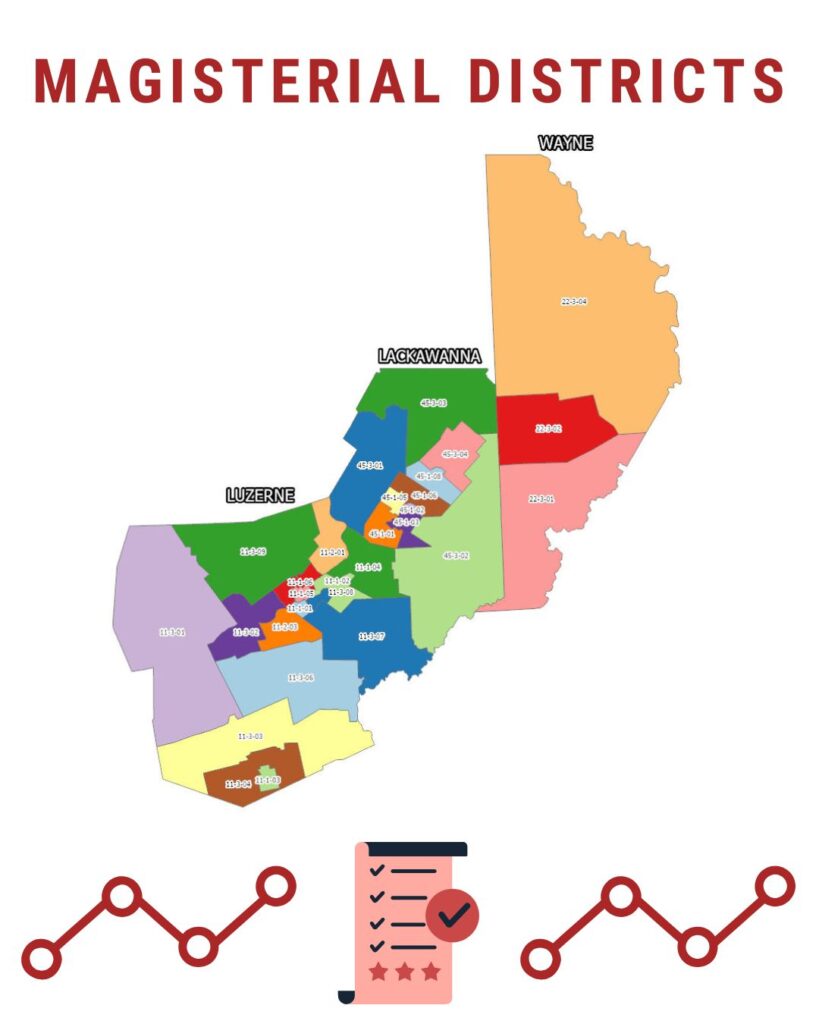
School Districts
Board of School Directors – 4 Year Term
A school board is a group of nine locally elected citizens—called school directors—who serve as the governing authority for each public school district. These individuals commit to four-year terms and receive no financial compensation for their service, despite the substantial time and dedication the role demands. Since school districts are established by state law, both the districts and their boards are considered agents of the Pennsylvania General Assembly. Empowered by Article III Section 14 of the state constitution, the Assembly authorizes school boards to provide and support a thorough and efficient system of public education. Acting as stewards of the district, school boards carry out responsibilities such as reviewing and approving the annual budget, levying and collecting local taxes, authorizing personnel appointments and salaries, adopting instructional plans, and selecting a superintendent to manage daily operations. Through this work, school boards shape the educational experience and uphold the public trust within their communities.
Why is it important?
The work of a school board member impacts children in the classroom and for the rest of their lives. This position plays a significant role in all actions and activities within a school.
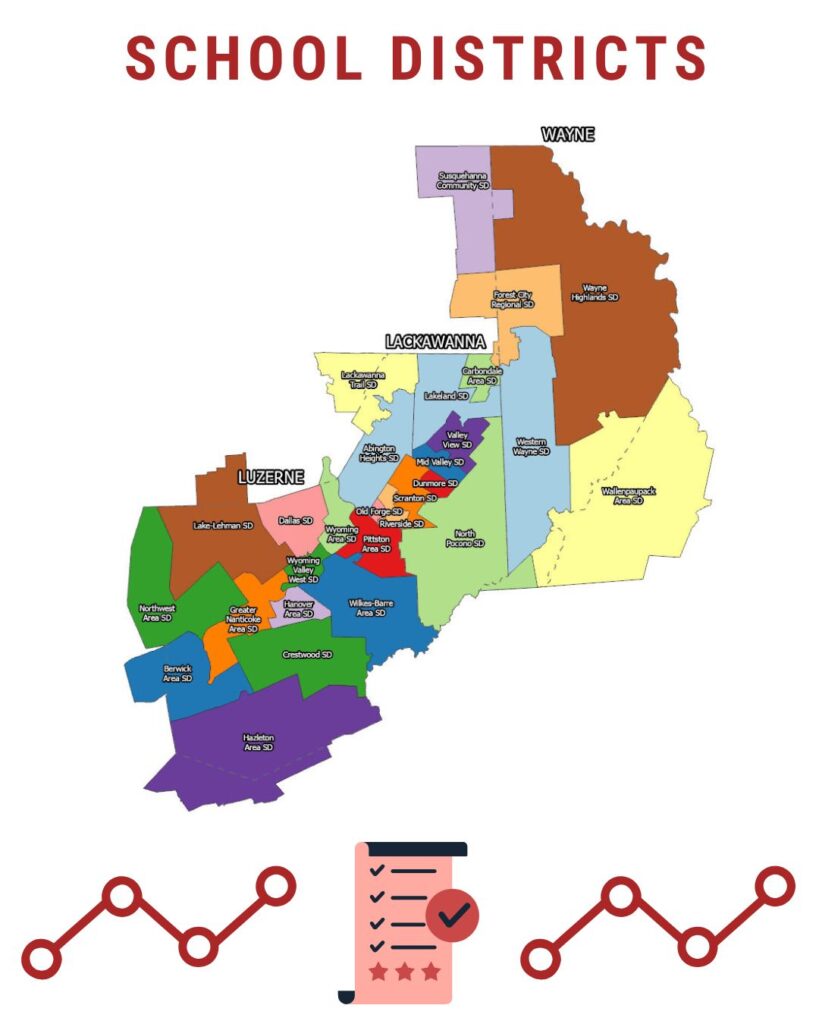
Boroughs, Cities, and Townships Elected Officials
Boroughs
Mayor – 4 Year Term
The Borough Mayor serves as the executive leader of the Borough, acting as its chief law enforcement officer and overseeing the enforcement of local laws. In times of emergency, the Mayor assumes control and leads the Borough’s response efforts. Although the Mayor does not participate in regular legislative voting, they may cast a vote in the event of a tie. Additionally, the Mayor holds veto power over legislative decisions, providing a check against the Borough council. Uniquely, the Mayor is the only elected official who works in the Borough on a daily basis, making them a consistent and visible presence in local government operations. (Additional information: Borough Mayor’s Manual) .
Why is it important?
As the only regularly working elected official and someone in charge of borough law enforcement and emergencies, this position affects the public safety of all residents in their community.
Council members – 4 Year Term
Borough Council members play a vital role in local governance by adopting the Borough’s annual budget and establishing operating policies and procedures. They are also responsible for approving contracts and enacting ordinances to ensure public safety and promote the welfare of the community. Councils may be elected either at-large or by wards, depending on the Borough’s structure. In areas without wards, seven members are typically elected at large. Conversely, Boroughs with wards have the option to reduce the Council’s size to three or five members. To maintain continuity in leadership, Council elections are generally staggered so that not all seats are up for election at the same time. (Additional information: Borough Council Handbook)
Why is it important?
Council members serve to create laws and ordinances that drive everyday life including legislating and funding police, fire, and other emergency services in the community.
Tax Collector – 4 Year Term
The local tax collector is a municipal officer responsible for collecting real estate and personal taxes levied by the municipality and school district, and often by the county as well. This individual plays a critical role in ensuring that public funds are collected accurately and efficiently, prepares detailed reports of all transactions, and transfers the funds to the appropriate governing bodies. In addition to managing the financial aspects, the tax collector often interacts with the public, addressing questions and resolving disputes related to tax payments. To safeguard the integrity of the position and protect public money, the tax collector is legally required to be bonded, serving as a guarantee against potential mismanagement or fraud. (Additional information: Tax Collectors Manual).
Why is it important?
The tax collector acts as a crucial link between taxpayers and the government. They ensure that every payment is accurately recorded and properly allocated to municipal, school, and often county authorities, depending on local laws. This function maintains the financial integrity of public services and helps support everything from infrastructure to education. It’s a role that requires precision, transparency, and a strong sense of civic responsibility.
Cities
Mayor – 4 Year Term
Cities in Pennsylvania are categorized by classes. All four third-class cities operate under the Commission form of government. These cities have a Mayor and four council members, each serving four-year terms. The terms are considered at large (not based on specific geographic areas within the city), and the terms are staggered. In the Commission form, the Mayor presides over the Council during sessions. The Mayor manages the police, planning commission, and redevelopment agencies. The Mayor also has the authority to execute laws and, during riots, can serve as a sheriff. However, this form of government is not considered a “strong” mayor system. Scranton, as a Class 2-A city with a home rule charter, uses the Mayor–Council form of government. In Scranton, the Mayor can appoint and remove officials, develop the city budget, and has veto power over legislation.
Typically, the Mayor can be likened to the Chief Executive Officer of the City, although it is limited in the Council-Manager form of government.
Why is it important?
The Mayor is usually the highest-ranking position in the City. They have the most visibility and are often the most influential decision maker in the community. Local elected offices like this have greater influence over residents’ daily lives because issues such as public safety, public services, planning, zoning, and regulations are close to home.
Council Members – 4 Year Term
In the commission form of third-class cities, the council has significant powers in overseeing and managing the city, as well as in creating ordinances and laws. In the class 2-A city of Scranton, there are five council members, elected at large and serving staggered terms. In the commission form, each council member administers a city department and appoints city officers.
Why is it important?
Like the Mayor, Council Members make decisions on services that affect residents and businesses every day. Due to this impact on the average person, local elected offices are very important, and these individuals are entrusted with powers that can make lives safer, more efficient, and more cost-effective.
Controller (sometimes referred to as Auditor) – 4 Year Term
This position is appointed in the Third Class cities of the Commission Form. The controller must be an accountant and be able to be bonded. The controller approves all payments, provides the annual audit, and has the authority to issue subpoenas. The controller is independent of the Mayor and City Council. Some cities elect the controller but appoint the auditor. Hazleton, Pittston, and Carbondale do not have an elected Controller; however, Scranton and Wilkes-Barre do.
Why is it important?
The City Controller is an independent position that ensures the proper management and use of City funds. They can provide objective information on the finances and make recommendations to improve the City’s financial position. This position serves as a steward for the people, ensuring that the local government organization utilizes the public’s money as efficiently and effectively as possible.
Treasurer (or Tax Collector) – 4 Year Term
In counties classified as third through eighth class, county commissioners may arrange for the collection of county taxes in third class cities through the county treasurer. In these cities, there could be either an appointed treasurer or a director of finance, and the city may also opt to elect this position. In all five cities in the region, taxes are either collected by the county or handled by an independent tax administrator such as Berkheimer. There are no elected tax collectors, but city staff are responsible for managing and maintaining tax records.
1st Class Townships
Commissioners – 4 Year Term (Half of the board is up for election each year.)
A board of commissioners is elected in First Class Townships and serves as the legislative body of the townships. Each commissioner has a combined set of roles within the board for separate branches of government for state and federal. The board sets policy, enact ordinances and resolutions, adopts a budget, and levying taxes. The board may also perform executive functions since there is no elected Executive.
Why is it important?
Township Commissioners have a lot of responsibility and must listen and provide for the population within the township. The commissioners will also appoint individuals for the various departments within the township that work to keep the township clean, safe, and sustainable.
Auditors/Controller – 6 Year Term
The elected auditors or controller conduct the annual audit of township finances. There is an exception when an independent auditor is appointed, and the majority of first-class townships have independent auditors.
Treasurer/Tax Collector – 4 Year Term
The tax collector has the responsibility to collect all taxes for the township. The list of taxes include county, institution direct, township, school district, and other taxes levied within the township. Also, they collect assessments for streetlights, and ornamental street lighting.
2nd Class Townships
Supervisors – 6 Year Term
In second class townships, the supervisors are tasked with the general governance of the township and have both legislative and executive powers. Each member of the board of supervisors combines roles found in the separate branches of the state and federal government. The board sets policy, enacts ordinances, adopts a budget, and levies taxes. The board also performs all executive powers like formulating a budget, ordinance enforcement, approving expenses, as well as hiring and overseeing employees.
Why is it important?
Township Supervisors have a lot of responsibility and must listen and provide for the population within the township. The supervisors will also appoint individuals for the various departments within the township that work to keep the township clean, safe, and sustainable.
Auditors/Controller – 6 Year Term
The three elected auditors conduct the annual audit of township finances and set the compensation, including paid time off, of any township supervisors employed by the township. Second class township supervisors could appoint a certified public accountant to perform the audit in place of elected auditors.
Treasurer – 6 Year Term
The treasurer collects school, county, and township real estate taxes. Also collects assessments for streetlights, fire hydrants, and select garbage taxes.
Voting Resources
Understanding what our local government officials do highlights just how important every election is. Local races have lower turnout than state-wide and national races, despite the impact local officials have on daily life. You can learn more about voter turnout and participation on The Institute’s Indicators Dashboard.
The following resources were curated to help more Pennsylvanians register to vote and make their voice heard on election day.
- Register to Vote in Pennsylvania
- Update Voter Registration – This is the same form to register to vote. Choose the option on question 3 to update your address, name, or party affiliation.
- Find your Polling Place – Enter your address to find your in-person voting location.
- Vote by Mail Application – You must be registered to vote first before filling out an application to absentee vote or vote by mail.
- Find Accessible Voting Near You – Information for anyone who may need assistance in casting their vote.
- Contact Your County Election Officials – The state provides a complete listing of the board of elections in each Pennsylvania county, with links to their websites.
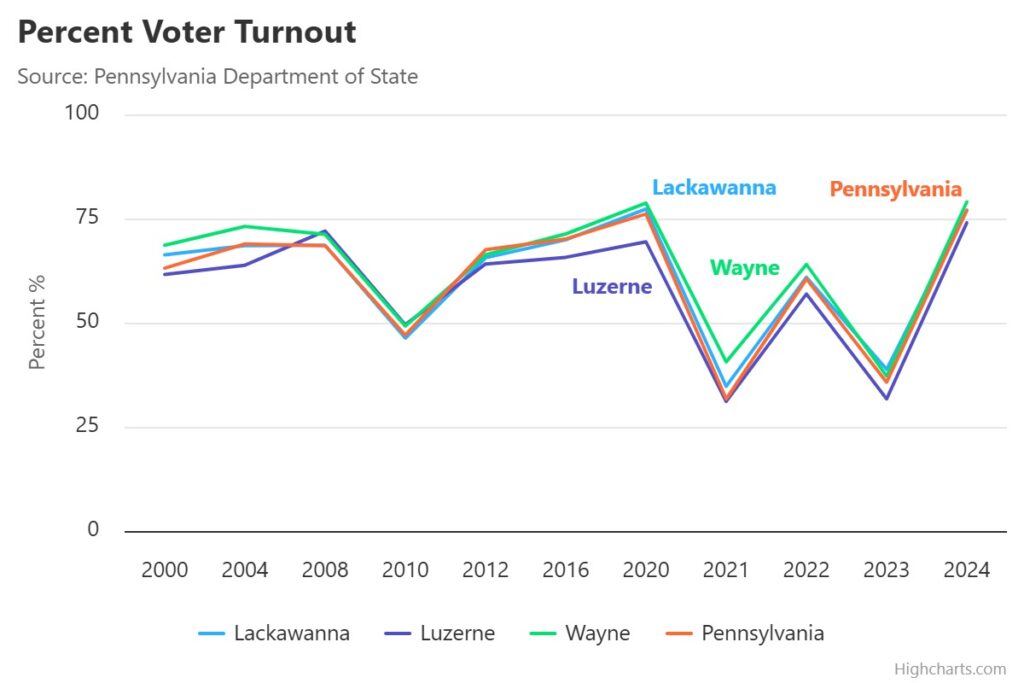
Sources
Primary Source Used: Citizen’s Guide to Pennsylvania Local Government
Other References Cited: Municipal Statistics ,The Pennsylvania Manual Volume 126 ,Elective Office in Local Government 2022 , CityGovenmentInPA_2017_GUIDELINES , Township Commissioner’s Handbook , Township Commissioners Handbook , Borough Mayor’s Manual .




 Dr. Jolene Carey-Pace joined The Institute Team in 2021 as a Research Analyst. In 2023, she was named Senior Research & Policy Analyst.
Dr. Jolene Carey-Pace joined The Institute Team in 2021 as a Research Analyst. In 2023, she was named Senior Research & Policy Analyst.  Sarah, a former Institute intern, joined The Institute in April 2021 as a Research Assistant. She started her new role as a Research Analyst in January 2024.
Sarah, a former Institute intern, joined The Institute in April 2021 as a Research Assistant. She started her new role as a Research Analyst in January 2024. 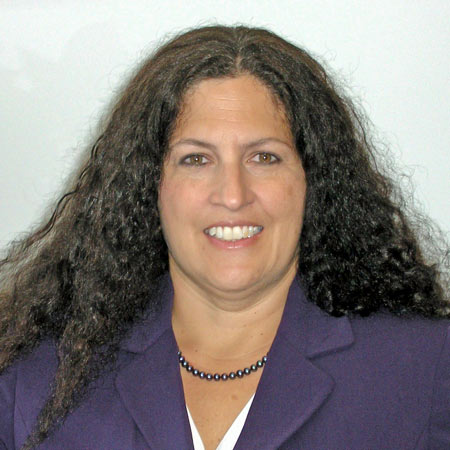 Ooms is responsible for all facets of research, organizational strategy, and management. Ooms is an active principal investigator in all Institute research. Ooms has been nationally recognized as a leader in regional economic development. She turned that skill into a research institute to help other regions develop and prosper. Her strategic skills have allowed The Institute to expand its services to the private and non-profit sectors for research and analysis in community health needs assessments, strategic planning, market and feasibility studies, and economic impact analysis.
Ooms is responsible for all facets of research, organizational strategy, and management. Ooms is an active principal investigator in all Institute research. Ooms has been nationally recognized as a leader in regional economic development. She turned that skill into a research institute to help other regions develop and prosper. Her strategic skills have allowed The Institute to expand its services to the private and non-profit sectors for research and analysis in community health needs assessments, strategic planning, market and feasibility studies, and economic impact analysis. Jill Avery-Stoss joined The Institute in June 2018 to fill the newly-created role of Research, Data, Intern & Administrative Coordinator. She assists with the collection and management of data for purposes of ethical and efficient analysis. She visits partner campuses to market The Institute’s internship opportunities, and participates in event-planning logistical activities as well. In 2021, Jill was promoted to Director of Operations to reflect the diversity in her job description and the additional marketing and communication functions she successfully mastered in 2020. In 2022, Jill was named Chief Operating Officer after expanding into both research and administrative management functions. Jill is taking on project management, fundraising, and other executive leadership functions of the organization. In 2024, Jill Avery-Stoss assumed the role of President of The Institute, effective January 2025.
Jill Avery-Stoss joined The Institute in June 2018 to fill the newly-created role of Research, Data, Intern & Administrative Coordinator. She assists with the collection and management of data for purposes of ethical and efficient analysis. She visits partner campuses to market The Institute’s internship opportunities, and participates in event-planning logistical activities as well. In 2021, Jill was promoted to Director of Operations to reflect the diversity in her job description and the additional marketing and communication functions she successfully mastered in 2020. In 2022, Jill was named Chief Operating Officer after expanding into both research and administrative management functions. Jill is taking on project management, fundraising, and other executive leadership functions of the organization. In 2024, Jill Avery-Stoss assumed the role of President of The Institute, effective January 2025.